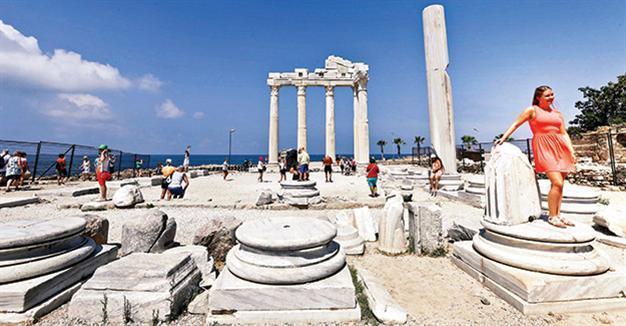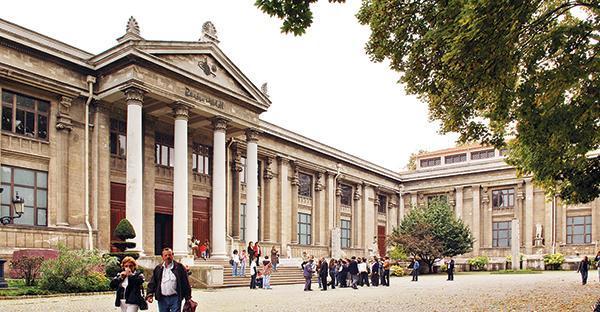Hike in museum admission fees in Turkey raises concern
Silay Sıldır – ISTANBUL
 Public museums are public property, but a massive increase in ticket prices by the private company that collects gate receipts has raised fears of a massive drop-off in the number of visitors while also raising questions about culture and the public good.
Public museums are public property, but a massive increase in ticket prices by the private company that collects gate receipts has raised fears of a massive drop-off in the number of visitors while also raising questions about culture and the public good.The entrance to major museums and historical sites were privatized in 2010 and operational rights for ticket offices were given to the Association of Turkish Travel Agencies (TÜRSAB) after a tender launched by the Culture and Tourism Ministry. Since then, the income generated from this public space no longer belongs to the public; instead, the income from entry fees has been shared with the private sector while the amount of money transferred from the public to private sector has not been divulged.
In addition to the public interest, public participation in museums is also evaporating, with rising entrance costs deterring locals.
Last week, announced price rises that could go as high as 400 percent for major ancient sites and museums operated by TÜRSAB aroused widespread opposition once again. The pricing strategy positions the museums as luxury consumer goods or as touristic products which can only be enjoyed by high-income groups, even though museums address all layers of society and tackle social exclusion.
Asked how public interest would be protected under the circumstances, the Labor Union of Culture, Art and Tourism Employees (Kültür Sanat Sen) said TÜRSAB’s presence in the operation of museums was no longer legal due to a recent court order and that there was no legal ground for the transfer of the money or the tender.
Kültür Sanat Sen Chairman Yavuz Demirkaya said the Ankara 3rd Administrative Tribunal’s order from last year had canceled the tender.
Republican People’s Party (CHP) Ankara deputy Gülsün Bilgehan has also submitted a parliamentary question for Culture and Tourism Minister Mahir Ünal, asking for a cancelation in price increases due to an expected decrease in visitor numbers expressed by the tourism sector.

Kültür Sanat Sen formerly appealed to the court multiple times starting in 2010 after the launch of the tender for the privatization of the box offices of 48 major public museums and ancient sites such as the Hagia Sophia Museum, the Topkapı Palace Museum and Ephesus. In 2014, 105 more sites were privatized, with their operational rights being given to TÜRSAB, ensuring that income generated by a public facility would be transferred to the private sector.
The government, meanwhile, refused to declare how much of the income is being given to TÜRSAB, declaring it “confidential business information.”
“This time it won’t be us but the legal entities who will be questioning the amount of money which was directed to the private sector. Not divulging the amount of money on the grounds that it is ‘confidential business information’ is not a transparent attitude. Since when is the government in the trade business?” Demirkaya added.
Kültür Sanat Sen’s lawyer, Yaşar Akı, said the final decision of the court was officially delivered on April 8, 2015, and that it should have gone into effect on May 8, 2015. Akı said the court decision necessitates the cancelation of the tender, meaning the whole income generated by the ticket offices should be returned to the government.
“The current situation is causing the state an enormous economic loss. The court order is binding for all parties, and disobeying it is unconstitutional. There is nothing to discuss about it – it is clearly a crime not to implement the order’s requirements,” Akı said.
Privatization and the resultant astronomical rises in ticket prices have precipitated a noticeable drop-off in the number of visitors, with staff at the Hagia Sophia Museum reporting few visitors from Turkey.
Museum staff said there were some residents of Cankurtaran, which is in the vicinity of the museum, that had never been to a museum, particularly women who are not employed outside the home.
Museum workers also stated that they proposed projects to attract underprivileged groups and suggested a free day for visits, only to be rejected by TÜRSAB.
Another party that criticized the increase in prices was the Turkish Association of Archaeologists. “It was only last week that the culture minister delivered a speech on their wish to attract people to museums. Today, this price increase is a huge contrast to the expectation. The price adjustments put the rates on a par with those in Europe, but considering our minimum wage, museum visits are a utopia for a family,” the association said.
“Everyone has the right freely to participate in the cultural life of the community, to enjoy the arts and to share in scientific advancement and its benefits,” according to Article 27 of the Universal Declaration of Human Rights, which was adopted by the Turkish government as early as April 1949.
















